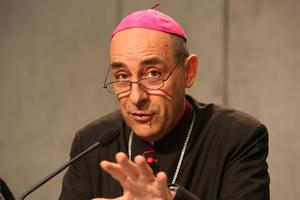Archbishop Paglia: Post-Synodal Apostolic Exhortation Published By End of March
Archbishop Victor Manuel Fernandez, one of Pope Francis closest advisers, believed to be the document's principal drafter.

The president of the Pontifical Council for the Family has confirmed that Pope Francis’ post-synodal apostolic exhortation devoted to the family will be published by the end of March.
Archbishop Vincenzo Paglia reportedly disclosed the news today at a conference with priests in Portugal, according to Il Sismografo, a semi-official Vatican news aggregator supervised by the Secretariat of State.
The Italian archbishop said the much-anticipated document, which summarizes the Pope’s conclusions of the two synods dedicated to the family, will be “a hymn to love, a love that wants to take care of the welfare of the young, to be close to wounded families to give them strength, a love that wants to be close to children as well as to all mankind in need. "
Well informed sources have told the Register that the document, which observers believe will probably be released on March 19 — the feast of St. Joseph and the 3rd anniversary of the Pope's inauguration Mass — is in its third draft. They also say that the chief drafter is Archbishop Victor Manuel Fernández, rector of the the Pontifical Catholic University of Argentina in Buenos Aires and one of Pope Francis’ closest advisers.
One reliably informed source, a recognized moral theologian who has seen the draft, said he was "deeply disturbed" by the text as it “calls into question the natural moral law”. A senior Vatican official said he had heard the draft was good, but that was "some time ago". He said he expects it to be similar to the Ordinary Synod's final report, almost all of which the synod fathers passed unanimously.
Many are looking to the post-synodal apostolic exhortation on the family to give clarification on where the Pope stands on the issue of Communion for remarried divorcees, and what it will say about other crucial moral and theological issues.
Earlier this week, Vatican analyst Andrea Gagliarducci reported that the Congregation for the Doctrine of the Faith has studied the draft and sent a long note with several doctrinal remarks, rumored to be 40 pages in length.
A senior Vatican source told the Register last week that the CDF has offered “all kinds of observations” on other documents as well during this pontificate, “but none of them are ever taken." The dicastery, like much of the Roman Curia, is largely left out of such processes and is considered to be “isolated”, according to sources.
This would tally with what Archbishop Fernández himself said in an interview earlier this year, when he remarked that the Roman Curia “is not essential” and that the Pope “might as well go and live outside Rome, and have a dicastery in Rome and one in Bogota." The Pope's aides, and the Holy Father himself, consider much of the Curia, and its way of operating, to be an obstacle to reform.
News that Archbishop Fernandez is believed to be drafting the document is not surprising as the Argentine rector is widely believed to have ghost-written the Pope’s first post-synodal apostolic exhortation, Evangelii Gaudium, as well as written early drafts of Francis’ environment encyclical, Laudato Si. He is also thought to have helped write the Pope’s controversial closing speech at last year’s synod.
In his comments in Portugal, Archbishop Paglia lamented a "big gap between the family and the parish", adding that the family often finds obstacles in church "bureaucracy, in aging [structures] or functionalism. There is not always the warmth, hospitality and care needed.”
"The challenge for Christians today is to be beside families without labeling," he said. "We should always look at the positive side of the family and make it grow."
The Italian prelate ended by recalling the many families who live through trauma because of “war, poverty, unemployment and social instability, especially those who are forced to live as refugees." Many governments, he said, “do not have a family policy, and this is very serious”. He reiterated that "the real strength of a society is the family.”
This article has been updated since it was first published to include some new information.
- Keywords:
- archbishop victor manuel fernandez
- archbishop vincenzo paglia
- pope francis
- post-synodal apostolic exhortation
- remarried divorcees
- synod on the family


















